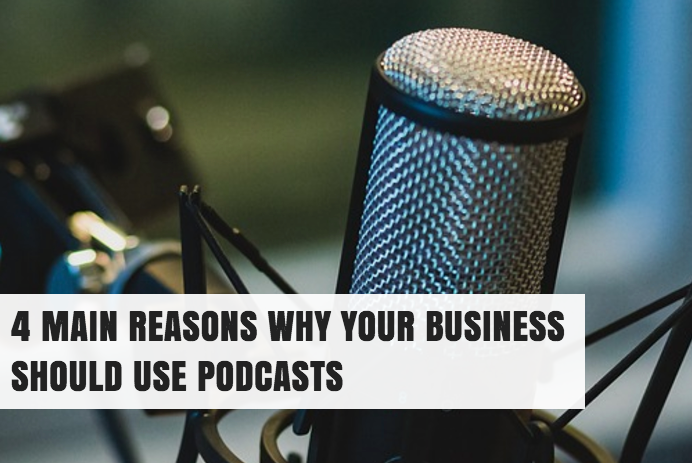Podcasts are classic workhorses in the digital marketing space.
Not only has it helped a good number of webpreneurs or business owners with bringing in more clients, but even the podcast listeners themselves are getting tons of value out of it.
This business-building strategy has proven itself to be so effective, that the speed of which the marketing method is gaining traction is nothing short of a miracle.
If you’re still thinking twice about whether or not you should use podcasts, then you can check out some of the main reasons why businesses should start it.
1. Branding
There are a plethora of ways podcasts can help you with establishing your brand.
For one thing, having a podcast will make you even more accessible to your audience. The fact is, while written content is great, having a podcast has its advantages.
For example, your audience won’t be able to read your articles when they’re driving or going for a jog.
When you have a podcast, on the other hand, they can consume your content even when they’re on the road or while preparing their meals.
Influencers are all too aware of the power of podcasts that several of them are consistently publishing their podcast episodes on iTunes and other platforms. Tai Lopez is one such influencer.
Through his podcasts, he managed to help countless people by helping them better themselves. The messages he shares on his episodes are so powerful, that he’s managed to garner close to a 5-star rating, with over 5,000 people rating his podcasts.
Of course, Tai is just one of the many influencers who is using podcasts to further their business. And you can bet your family jewels that they’re getting amazing results out of their endeavor.
2. Trust
Because podcasters open themselves to a higher level of transparency to their audience — compared to them publishing articles — it becomes easier for them to establish trust.
That right there is crucial. Because when trust is built between business entities and their audience, sales, leads, and business growth (among other things) is bound to happen next.
Riling up audience engagement is also a lot easier to pull off when there is trust between the business owners and their audience.
Because of the trust that’s been built, the audience won’t worry about sharing their struggles; they know all too well that the podcaster won’t judge them.
More than knowing that they won’t be judged, they’re even expecting the podcaster to share their insights on how they can solve their problems. This compels them (and others) to share even more.
The win-win situation is a perfect recipe for business growth.
It breeds trust, a deeper level of relationship, and it makes you — the business owner — the go-to-guy of your audience when they’ll experience challenges.
When you’ve managed to establish a meaningful relationship with your audience, it becomes almost impossible for your competitors to snatch them from you.
What’s even better is your audience will refer you to their circle of influence via word of mouth, which is arguably one of the best marketing methods a business can ever have going for them.
3. It is perfect for networking.
Here’s a question: How would you feel if someone reached out to you then asked if they can feature you in their podcast?
You’d be stoked, wouldn’t you?
And if you’re being honest, you’d probably give the person a big warm hug for the opportunity.
I don’t blame you.
After all, you can use the opportunity as a springboard to grow your business.
Once you’ve been featured, it becomes highly likely that someone from the audience will reach out to you and inquire about your services, or you can use it to establish strategic relationships.
TL;DR: Podcasts are perfect networking tools.
Of course, networking is just the tip of the iceberg.
Once you’ve built a network of like-minded individuals, you’d have access to all sorts of opportunities.
Starting a mentorship business is a good example.
While it is true that starting a mentorship business isn’t exactly easy, there are several action steps or marketing strategies that you can use to help you succeed — of course, having a podcast series is one of those.
The good news is, it’s not even that hard to start one. You just need to make sure that you have the crucial elements in place, and you’d be able to start churning up your podcast episodes.
4. Lead generation
Podcasting and generating leads are a match made in heaven.
Let me explain why I’m saying that…
As I’ve mentioned, when you have a podcast series, it becomes easier for you to establish trust with your audience, right?
Not only that, but you’ll find it a lot easier to network with other influencers since you can feature them in your podcasts.
Now, here’s where podcasts can work its magic when it comes to helping you generate leads…
- Freebies
You can tell your audience during one of your podcast episodes that you’ll give away a freebie if they’ll sign up to your opt-in form.
- Access to the beta version of your products for those who will signup
As you run your podcast series like you normally would, you’ll mention several times in your episode that you’re giving away access to the beta version of can you buy real phentermine online your new product to those who will opt into your updates.
- Influencer marketing
Here’s the deal, should you decide to run your very own podcast series in the future, try to feature influencers (those with a decent number of followers), over those who do not have an established brand visibility.
After all, when you have influencers sharing your content with their audience, or them spreading the news about your business, your likelihood of growing your followers increases because the influencers themselves already have followers (they number by the thousands, in most cases).

